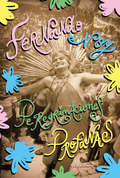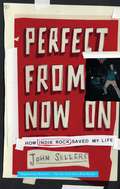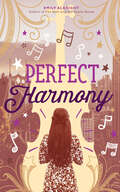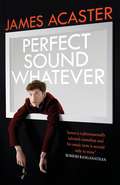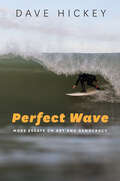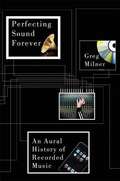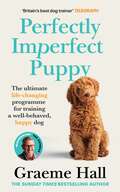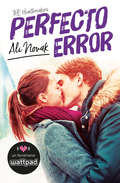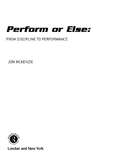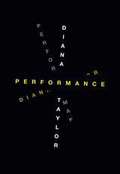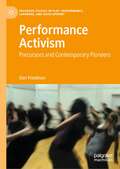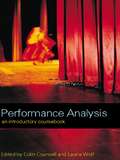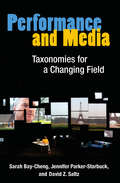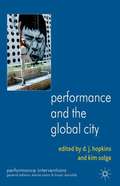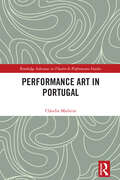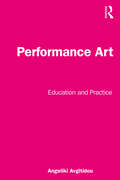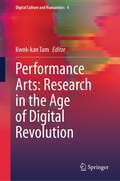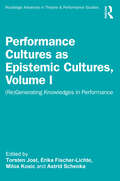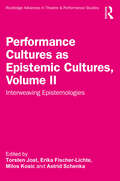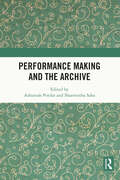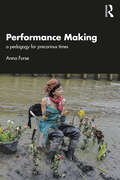- Table View
- List View
Percy Jackson and the Olympians: The Official Cookbook
by Jarrett MelendezDine like a demigod with over 60 recipes fit to be served anywhere from Camp Half-Blood to Mount Olympus in the only official collection developed for fans of the books and the Disney+ Original Series.Make any meal an epic offering to your friends and family, with mythical recipes inspired by Percy Jackson and the Olympians. Filled with delicious dishes straight from Sally Jackson&’s kitchen, Aunty Em&’s Garden Gnome Emporium, Waterland, and beyond, this cookbook is a hero&’s culinary journey of its own. Featuring instructions from Grover Underwood, helpful tips and tricks from Annabeth Chase, plus full-color photography, this deluxe recipe book has all the essentials to see any home-chef fulfill their destiny. Not to mention a whole host of blue dishes, designed with love, to bring your community together over a dinner that looks as good as it tastes. QUEST YOUR WAY THROUGH OVER 60 RECIPES: Serve up dozens of appetizers, main courses, desserts, and beverages with roots in both classic Greek and American-style cuisines. BRING CAMP HALF-BLOOD TO YOUR HOME: From enchiladas to ambrosia, cook up dishes that bring the unique magic of Percy Jackson&’s world right to your kitchen. SEE PAST THE MIST WITH FULL-COLOR PHOTOGRAPHY: Stunning images throughout this cookbook reveal mythically good meals. PERFECT FOR ALL SKILL LEVELS: Great for beginners and experienced chefs alike, this cookbook will help you prepare amazing dishes for your friends and family inspired by your favorite gods and heroes. GIFTABLE & COLLECTIBLE: As the only officially licensed cookbook for the TV series, this is a must-have for any fan looking to capture the myth and the magic for themselves.
Perdón (Forgiveness Spanish edition)
by Chiquis Rivera"Escribí este libro no para para aclarar malentendidos sino para compartir algo mucho más importante y valioso: mi largo camino hacia el perdón"Chiquis Rivera es la cantante y celebridad de televisión que saltó a la fama de la mano de su madre, la popular Diva de la Banda, Jenni Rivera. En Perdón, su primer libro autobiográfico, narra con detalle estremecedor el abuso al que fue sometida por su propio padre durante su infancia, y explica cómo logran sobrevivir las víctimas a tan corta edad. A la vez nos revela su tortuosa vida sexual, al crecer marcada por las heridas del abuso, y comparte cómo logró vencer sus miedos al amor y a la intimidad. La joven cantante también se atreve por primera vez a confesar otro gran secreto que llegó incluso a ocultarle a su madre en vida. Estas páginas también plasman la conversación que quedó pendiente entre Jenni y Chiquis, después de que se distanciaran. En Perdón salen a la luz verdades desgarradoras entre madre e hija que ya nunca podrán contarse frente a frente. A dos años de la muerte de su madre, Chiquis contesta las preguntas más difíciles: ¿Pudieron madre e hija hacer las paces? ¿Quién ha perdonado a quién en esta historia de grandes éxitos y de grandes tropiezos?
Peregrinaciones profanas
by Fernando NoyElegido Reina del célebre carnaval de Salvador Bahía, personaje central de la vida cultural argentina y animador gay inigualable de la escena under desde hace cuatro décadas, Fernando Noy cuenta todo en un libro imperdible donde conviven lo más granado de los habitués de los bares porteños de los 60 a las leyendas del tropicalismo. De Pizarnik a Caetano Veloso, de Mercedes Sosa a Tanguito, de Sumo a María Luisa Bemberg, Noy se ha convertido en el cronista más desenfadado de una historia que pedía a gritos su Homero. «¿Quién nos quita lo brillado?, se pregunta Fernando Noy y sigue el consejo de su amigo Pedro Lemebel que solía decirle, con sabiduría de Machi: 'No hables más, Noy: escríbelo'. Y finalmente lo hizo. Aquí están sus memorias, estas Peregrinaciones profanas, puro vértigo de purpurina, cemento y rincones donde el desamparo se convierte en jardín secreto. El propio nacimiento anunciado por la caída de un jinete mapuche; una cartografía del deseo suburbano con las locas del Oeste en los años 60; los náufragos hippies en flor; las temporadas en París o Bahía. Y, por supuesto, las amistades sagradas de Alejandra Pizarnik, Marosa Di Giorgio, María Luisa Bemberg, Batato Barea, Paco Jamandreu, Alejandro Urdapilleta y tantos más. Entre carnavales, lisergia y poetas, desfilan las deidades de Noy y él nos bendice con su misticismo afro-celta, sus túnicas y collares, su inefable paso andrógino que es maravilla, desafío y carcajada.»Mariana Enríquez «Cuando no existía la palabra queer la poeta, la vedette, la actriz, nuestro Fernando Noy, la estaba inventando. Lean estas memorias danzantes de la reina de la fiesta de la libertad y el arte.»Gabriela Cabezón Cámara «Sabíamos que Noy, poeta 24 horas, tenía el don de adelantarse al futuro. Ahora sabemos que es capaz de atravesar la memoria de su tiempo y recuperar un pasado por venir, impredecible, lleno de promesas.»Liliana Viola Noy va narrando un laberinto de encuentros increíbles, pero siempre reales. De la niñez patagónica a la adolescencia del yire hermafrodita con las locas del Oeste en los 60, a la fugaz militancia frustrada por su homosexualidad. El nacimiento alucinógeno y anfetamínico de venta libre en farmacias del hippismo se sobrexpone con el descubrimiento de la bohemia del Di Tella. La crónica de sus amistades son el índice onomástico de la Historia de la Cultura y el Espectáculo de la Argentina de la segunda mitad del siglo XX. Cuando la Junta Militar prohibía los carnavales, Noy se coronaba reina en Bahía, donde se había exiliado. Trepado al árbol de un neuropsiquiátrico parisino donde había sido internado por tratar de recuperar "sus" joyas de faraona en medio de un viaje con drogas, ve llegar a Jackie O. y María Callas al hospital donde acababa de morir Aristóteles Onassis... Quien se anime a seguir, en estas páginas plagiadas a sí mismo, su incesante deambular, encontrará un mundo fantástico, sobreimpreso con purpurina, visible de noche. Y también para quienes buscan las claves de una fiesta eterna y compartida.
Perfect From Now On: How Indie Rock Saved My Life
by John SellersTOP FIVE MUSICAL THINGS I HOPE HAPPEN NOW THAT THE ORIGINAL LINEUPS OF THE PIXIES AND DINOSAUR JR. HAVE REUNITED1. Ian Curtis is resurrected. 2. The Smiths reunite for a private party at my favorite bar. 3. There is a new My Bloody Valentine album. 4. A new Nirvana comes along to blow away all of those fey Duran Duran emulators. 5. Radiohead stops listening to Pink Floyd and starts listening to Black Sabbath. If you've ever made, or conceived of, a list like this, then look no further for your next book purchase. You have it. In your hands. Please consider it as your next book purchase. In Perfect From Now On, John Sellers has written a fan's memoir overflowing with humor, self-deprecation, encyclopedic knowledge of musical minutiae, and "you should have been there" personal anecdotes. Despite vowing never to get caught up in music due to the nuttiness of a Dylan-obsessed father and playground taunts about his preference for Top 40 trash, he found himself powerless to resist the allure of indie rock, the genre that begat the likes of Sonic Youth, Pavement, Built to Spill, and Modest Mouse. When his favorite band, Guided By Voices, called it quits in 2004, Sellers examined his own listening habits, caught a few mind-blowing shows, got drunk with his heroes, and wrote this book -- one that is sure to resonate with anybody who has ever obsessed over good music.
Perfect Harmony
by Emily AlbrightThis wasn’t in the sheet music. 17-year-old Pippa Wyndham is a top cellist, never settling for second chair. But she faces stiff competition from cocky Declan Brogan, a transfer student who matches her in ambition and talent. Forced together for a duet, the battle gets heated. But as the recital approaches and their rivalry evolves, Pippa finds herself at risk of losing her best friend, her future, and the boy she’s falling for. An orchestral YA romance in the key of Jennifer L. Armentrout and Always and Forever, Lara Jean.boosts#toggleFormOnEscOrEnter" data-boosts-adding-class="boosts--adding" data-boosts-deleting-class="boost--deleting">
Perfect Sound Whatever: THE SUNDAY TIMES BESTSELLER
by James Acaster*The Sunday Times Bestseller*The brand new memoir from James Acaster: cult comedian, bestselling author of Classic Scrapes, undercover cop, receiver of cabbages.PERFECT SOUND WHATEVER is a love letter to the healing power of music, and how one man's obsessive quest saw him defeat the bullshit of one year with the beauty of another. Because that one man is James Acaster, it also includes tales of befouling himself in a Los Angeles steakhouse, stealing a cookie from Clint Eastwood, and giving drunk, unsolicited pep talks to urinating strangers. January, 2017James Acaster wakes up heartbroken and alone in New York, his relationship over, a day of disastrous meetings leading him to wonder if comedy is really what he wants to be doing any more. A constant comfort in James's life has been music, but he's not listened to anything new for a very long time. Idly browsing 'best of the year' lists, it dawns on him that 2016 may have been a grim year for a lot of reasons, but that it seemed to be an iconic year for music. And so begins a life-changing musical odyssey, as James finds himself desperately seeking solace in the music of 2016, setting himself the task of only listening to music released that year, ending up with 500 albums in his collection. Looking back on this year-long obsession, parallels begin to grow between the music and James's own life: his relationship history, the highs and lows of human connection, residual Christian guilt, and mental health issues that have been bubbling under the surface for years. Some albums are life-changing masterpieces, others are 'Howdilly Doodilly' by Okilly Dokilly, a metalcore album devoted to The Simpsons' character Ned Flanders, but all of them play a part the year that helped James Acaster get his life back on track.
Perfect Sound Whatever: THE SUNDAY TIMES BESTSELLER
by James Acaster*The Sunday Times Bestseller*The brand new memoir from James Acaster: cult comedian, bestselling author of Classic Scrapes, undercover cop, receiver of cabbages.PERFECT SOUND WHATEVER is a love letter to the healing power of music, and how one man's obsessive quest saw him defeat the bullshit of one year with the beauty of another. Because that one man is James Acaster, it also includes tales of befouling himself in a Los Angeles steakhouse, stealing a cookie from Clint Eastwood, and giving drunk, unsolicited pep talks to urinating strangers. January, 2017James Acaster wakes up heartbroken and alone in New York, his relationship over, a day of disastrous meetings leading him to wonder if comedy is really what he wants to be doing any more. A constant comfort in James's life has been music, but he's not listened to anything new for a very long time. Idly browsing 'best of the year' lists, it dawns on him that 2016 may have been a grim year for a lot of reasons, but that it seemed to be an iconic year for music. And so begins a life-changing musical odyssey, as James finds himself desperately seeking solace in the music of 2016, setting himself the task of only listening to music released that year, ending up with 500 albums in his collection. Looking back on this year-long obsession, parallels begin to grow between the music and James's own life: his relationship history, the highs and lows of human connection, residual Christian guilt, and mental health issues that have been bubbling under the surface for years. Some albums are life-changing masterpieces, others are 'Howdilly Doodilly' by Okilly Dokilly, a metalcore album devoted to The Simpsons' character Ned Flanders, but all of them play a part the year that helped James Acaster get his life back on track.
Perfect Sound Whatever: THE SUNDAY TIMES BESTSELLER
by James AcasterThe brand new memoir from James Acaster: cult comedian, bestselling author of Classic Scrapes, undercover cop, receiver of cabbages.PERFECT SOUND WHATEVER is a love letter to the healing power of music, and how one man's obsessive quest saw him defeat the bullshit of one year with the beauty of another. Because that one man is James Acaster, it also includes tales of befouling himself in a Los Angeles steakhouse, stealing a cookie from Clint Eastwood, and giving drunk, unsolicited pep talks to urinating strangers. January, 2017James Acaster wakes up heartbroken and alone in New York, his relationship over, a day of disastrous meetings leading him to wonder if comedy is really what he wants to be doing any more. A constant comfort in James's life has been music, but he's not listened to anything new for a very long time. Idly browsing 'best of the year' lists, it dawns on him that 2016 may have been a grim year for a lot of reasons, but that it seemed to be an iconic year for music. And so begins a life-changing musical odyssey, as James finds himself desperately seeking solace in the music of 2016, setting himself the task of only listening to music released that year, ending up with 500 albums in his collection. Looking back on this year-long obsession, parallels begin to grow between the music and James's own life: his relationship history, the highs and lows of human connection, residual Christian guilt, and mental health issues that have been bubbling under the surface for years. Some albums are life-changing masterpieces, others are 'Howdilly Doodilly' by Okilly Dokilly, a metalcore album devoted to The Simpsons' character Ned Flanders, but all of them play a part the year that helped James Acaster get his life back on track.
Perfect Wave: More Essays on Art and Democracy
by Dave HickeyWhen Dave Hickey was twelve, he rode the surfer’s dream: the perfect wave. And, like so many things in life we long for, it didn’t quite turn out----he shot the pier and dashed himself against the rocks of Sunset Cliffs in Ocean Beach, which just about killed him. Fortunately, for Hickey and for us, he survived, and continues to battle, decades into a career as one of America’s foremost critical iconoclasts, a trusted, even cherished no-nonsense voice commenting on the all-too-often nonsensical worlds of art and culture. Perfect Wave brings together essays on a wide range of subjects from throughout Hickey’s career, displaying his usual breadth of interest and powerful insight into what makes art work, or not, and why we care. With Hickey as our guide, we travel to Disneyland and Vegas, London and Venice. We discover the genius of Karen Carpenter and Waylon Jennings, learn why Robert Mitchum matters more than Jimmy Stewart, and see how the stillness of Antonioni speaks to us today. Never slow to judge—or to surprise us in doing so—Hickey powerfully relates his wincing disappointment in the later career of his early hero Susan Sontag, and shows us the appeal to our commonality that we’ve been missing in Norman Rockwell. With each essay, the doing is as important as what’s done; the pleasure of reading Dave Hickey lies nearly as much in spending time in his company as in being surprised to find yourself agreeing with his conclusions. Bookended by previously unpublished personal essays that offer a new glimpse into Hickey’s own life—including the aforementioned slam-bang conclusion to his youthful surfing career—Perfect Wave is not a perfect book. But it’s a damn good one, and a welcome addition to the Hickey canon.
Perfecting Sound Forever: An Aural History of Recorded Music
by Greg MilnerIN 1915, THOMAS EDISON PROCLAIMED THAT HE COULD RECORD A LIVE PERFORMANCE and reproduce it perfectly, shocking audiences who found themselves unable to tell whether what they were hearing was an Edison Diamond Disc or a flesh-and-blood musician. Today, the equation is reversed. Whereas Edison proposed that a real performance could be rebuilt with absolute perfection, Pro Tools and digital samplers now allow musicians and engineers to create the illusion of performances that never were. In between a century of sonic exploration into the balance between the real and the represented! Tracing the contours of this history,-Greg Milner fakes us through the major breakthroughs and glorious failures in the art and science of recording. An American soldier monitoring Nazi radio transmissions stumbles onto the open yet revolutionary secret of magnetic tape, Japanese and Dutch researchers build a first-generation digital audio format and watch as their "compact disc” is marketed by the music industry as the second coming of Edison yet derided as heretical by analog loyalists. The music world becomes addicted to volume in the nineties and fights a self-defeating "loudness war" to get its fix. From Les Paul to Phil Spector to King Tubby, from vinyl to pirated CDs to iPods, Milner pulls apart musical history to answer a crucial question: Should a recording document reality as faithfully as possible, or should it improve upon or somehow transcend the music it records? The answers he uncovers will change the very way we think about music.
Perfectly Imperfect Puppy: The ultimate life-changing programme for training a well-behaved, happy dog
by Graeme HallTHE NEW BOOK FROM GRAEME HALL, THE SUNDAY TIMES BESTSELLING DOGFATHER I've been training puppies for years and I am yet to come across one who behaved perfectly at all times. With this book I really wanted to be realistic about the expectations we should have when training a puppy and demystify the process with clear, simple advice, based on science and experience. In this stress-free guide you will learn how to: · Choose the right puppy for your lifestyle, including the benefits of a rescue dog · Introduce them to the family, other pets and children · Tackle separation anxiety · Train your puppy, while building understanding and trust · Socialise them, so they grow into a happy, well-adjusted dog · Prevent behavioural problems later in life I love working with puppies because there is so much potential to make a lasting difference to a dog's life and to their owner's. If you can get it right (or right-ish), you are paving the way for a lifetime of reliably good behaviour. Happy training! Graeme Hall
Perfecto error
by Ali Novak«Cuando conocí a Oliver Perry, no me di cuenta de que era el cantante de The Heartbreakers. Y él no tenía ni idea de que yo era la única chica del mundo que odiaba su música...» Stella haría cualquier cosa por su hermana. Incluso hacer cola durante horas para que los chicos de The Heartbreakers le firmen un CD. Al menos, ha conocido a un chico guapísimo cuando ha ido a por café, aunque no vaya a verle nunca más. Por supuesto, el destino le prepara una sorpresa: ese chico resulta ser Oliver Perry. Y, aunque ella le diga a la cara que su música es lo peor, él le da su número. ¿No es flipante? Reseña:«¡Para derretirse! ¡Me enamoré de Oliver Perry super rápido! Este libro te emociona... ¡Adoro cada página!»Anna Todd, autora de After
Perform or Else: From Discipline to Performance
by Jon McKenzie'Performance' has become one of the key terms for the new century. But what do we mean by 'performance'? In today's world it can refer to experimental art; productivity in the workplace; and the functionality of technological systems. Do these disparate fields bear any relation to each other?In Perform or Else Jon McKenzie asserts that there is a relationship cultural, organisational, and technological performance. In this theoretical tour de force McKenzie demonstrates that all three paradigms operate together to create powerful and contradictory pressures to 'perform...or else'. This is an urgent and important intervention in contemporary critical thinking. It will profoundly shape our understanding of twenty-first century structures of power and knowledge.
Performance
by Diana Taylor"Performance" has multiple and often overlapping meanings that signify a wide variety of social behaviors. In this invitation to reflect on the power of performance, Diana Taylor explores many of its uses and iterations: artistic, economic, sexual, political, and technological performance; the performance of everyday life; and the gendered, sexed, and racialized performance of bodies. This book performs its argument. Images and texts interact to show how performance is at once a creative act, a means to comprehend power, a method of transmitting memory and identity, and a way of understanding the world.
Performance Activism: Precursors and Contemporary Pioneers (Palgrave Studies In Play, Performance, Learning, and Development)
by Dan FriedmanThis is the first book length study of performance activism. While Performance Studies recognizes the universality of human performance in daily life, what is specifically under investigation here is performance as an activity intentionally entered into as a means of engaging social issues and conflicts, that is, as an ensemble activity by which we re-construct/transform social reality. Performance Activism: Precursors and Contemporary Pioneers provides a global overview of the growing interface of performance with education, therapy, conflict resolution, civic engagement, community development and social justice activism. It combines an historical study of the processes by which, over the course of the 20th Century, performance has been loosened from the institutional constraints of the theatre with a mosaic-like overview of the diverse work/play of contemporary performance activists around the world. Performance Activism will be of interest to theatre and cultural historians, performance practitioners and researchers, psychologists and sociologists, educators and youth workers, community organizers and political activists.
Performance Analysis: An Introductory Coursebook
by Laurie Wolf Colin CounsellThis revolutionary introductory performance studies coursebook brings together classic texts in critical theory and shows how these texts can be used in the analysis of performance. The editors put their texts to work in examining such key topics as: * decoding the sign * the politics of performance * the politics of gender and sexual identity * performing ethnicity * the performing body * the space of performance * audience and spectatorship * the borders of performance. Each reading is clearly introduced, making often complex critical texts accessible at an introductory level and immediately applicavble to the field of performance. The ideas explored within these readings are further clarified through innovative, carefully tested exercises and activities.
Performance And Media: Taxonomies For A Changing Field
by David Z. Saltz Sarah Bay-Cheng Jennifer Parker-StarbuckThis timely collaboration by three prominent scholars of media-based performance presents a new model for understanding and analyzing theater and performance created and experienced where time-based, live events, and mediated technologies converge-particularly those works conceived and performed explicitly within the context of contemporary digital culture. Performance and Media introduces readers to the complexity of new media-based performances and how best to understand and contextualize the work. Each author presents a different model for how best to approach this work, while inviting readers to develop their own critical frameworks, i. e. , taxonomies, to analyze both past and emerging performances. Performance and Media capitalizes on the advantages of digital media and online collaborations, while simultaneously creating a responsive and integrated resource for research, scholarship, and teaching. Unlike other monographs or edited collections, this book presents the concept of multiple taxonomies as a model for criticism in a dynamic and rapidly changing field.
Performance And The Global City
by Kim Solga D. J. HopkinsFollowing the ground-breaking Performance and the City, this volume, now available in paperback, explores what it means to create and experience urban performance - as both an aesthetic and a political practice - in the burgeoning world cities built by globalization and neoliberal capital. Featuring work by artists as well as scholars, written from multiple disciplinary perspectives, and including dozens of photographs as well as a photo essay by Nicholas Whybrow, Performance and the Global City will appeal to readers interested in urban studies, theatre and performance, geography, sociology, and globalization studies.
Performance Art in Portugal (Routledge Advances in Theatre & Performance Studies)
by Cláudia MadeiraThis book explores histories which have only recently been rediscovered by artists and researchers. This study explores the history of Portuguese performance art, in its various "speculative" and "performative" forms. The author approaches this relationship with the re-emergence and centrality of these (semi-)peripheral histories at an international level, whilst identifying some of their unique traits: their cycles of emergence and retraction in Portuguese history; their multiple and complex ontologies; the intertwined relations between the art of performance and the social performance of the Portuguese (regarding topics as sensitive and fracturing as those of the long dictatorship, the colonial war and the revolutionary process, or even the integration of Portugal in the European Community and, more recently, the various 21st century social, political and economic crises). This reading in turn covers the development of the relationship between performance and hybridism, namely, analyzing the recent dimension of meta-hybridism, in the processes of artistic homage that contemporary Portuguese creators have been establishing through access to the histories and archives of this historical genre. This book will be of great interest to students and scholars in theatre and performance studies, performance art and arts in general.
Performance Art: Education and Practice
by Angeliki AvgitidouPerformance Art: Education and Practice is an introduction to performance art through activities and practice prompts that are framed by seminal moments in the history of the medium as well as the current theoretical discussions surrounding performance. The book begins by introducing the terminology related to performance art and its early history. The basic elements of performance, including the body, objects, space, the public, and the public sphere are approached through thematic and conceptual correlations such as objects as autobiography, body as an expression of gendered identity, performance and the everyday, the augmented body, the archive of performance, and public space as space for intervention. Case studies analysed in each chapter are accompanied by reflective questions and discussion topics. The book proposes a wide range of exercises and comprehensive practice prompts that aim to enhance performance skills, promote experimentation, and encourage an experiential understanding of the theory, history, and concepts relating to performance art. Performance Art: Education and Practice is addressed to students of Fine Arts and Performance Studies from beginner to intermediate level, performance and visual artists who are interested in expanding their knowledge base and creative range, and artist-teachers who are interested in developing their own curriculum and workshop content.
Performance Arts: Research in the Age of Digital Revolution (Digital Culture and Humanities #4)
by Kwok-Kan TamThis volume reshapes a contemporary understanding of research in theatre and performance arts. Bringing together distinguished scholars from all over the world, the book serves as an arena for international scholars to introduce innovative research methodologies and disseminate their research findings regarding VLT, data archiving, and digital history and discusses the impacts of digital culture in art production, stage performance, film, and literature. The Ibsen focus in the book is illustrative of the power of digital database research that is generating new relations in spatial-historical dimensions that have otherwise gone unnoticed. It demonstrates how a new methodology can bring practical benefits to handling big data with the support of digital technologies. In line with the post-pandemic landscape, this book engages a reflection on how the digital revolution has brought about changes and challenges, and constraints and breakthroughs within the field of theatre and performance arts. It is of appeal to theatre artists and practitioners, scholars, critics, librarians, digital archive engineers, and postgraduate students interested in theatre, performance studies, digital media, information technology, library science, communication, education, sociology, as well as political science. “The book investigates the latest methodological development in digital cultures and performance arts, which significantly contributes to the ever-changing and increasingly advanced technological culture in this field.” - Jessica Tsui-yan Li, York University, Canada"In line with the post-pandemic landscape, this book engages the reader in reflecting on how the digital revolution has brought about chances and challenges, constraints and breakthroughs to the field of theatre and performance arts. An original, eye-opening and inspiring volume at multiple levels, this book brings together distinguished scholars from all over the world." - Dr Anna Tso, The Hang Seng University of Hong Kong
Performance Cultures as Epistemic Cultures, Volume I: (Re)Generating Knowledges in Performance (Routledge Advances in Theatre & Performance Studies)
by Torsten Jost, Erika Fischer-Lichte, Milos Kosic and Astrid SchenkaThis volume investigates performances as situated "machineries of knowing" (Karin Knorr Cetina), exploring them as relational processes for, in and with which performers as well as spectators actively (re)generate diverse practices of knowing, knowledges and epistemologies. Performance cultures are distinct but interconnected environments of knowledge practice. Their characteristic features depend not least on historical as well as contemporary practices and processes of interweaving performance cultures. The book presents case studies from diverse locations around the globe, including Argentina, Canada, China, Greece, India, Poland, Singapore, and the United States. Authored by leading scholars in theater, performance and dance studies, its chapters probe not only what kinds of knowledges are (re)generated in performances, for example cultural, social, aesthetic and/or spiritual knowledges; the contributions investigate also how performers and spectators practice knowing (and not-knowing) in performances, paying particular attention to practices and processes of interweaving performance cultures and the ways in which they contribute to shaping performances as dynamic "machineries of knowing" today. Ideal for researchers, students and practitioners of theater, performance and dance, (Re)Generating Knowledges in Performance explores vital knowledge-serving functions of performance, investigating and emphasizing in particular the impact and potential of practices and processes of interweaving of performance cultures that enable performers and spectators to (re)generate crucial knowledges in increasingly diverse ways.
Performance Cultures as Epistemic Cultures, Volume II: Interweaving Epistemologies (Routledge Advances in Theatre & Performance Studies)
by Torsten Jost, Erika Fischer-Lichte, Milos Kosic and Astrid SchenkaThis volume investigates performance cultures as rich and dynamic environments of knowledge practice through which distinctive epistemologies are continuously (re)generated, cultivated and celebrated. Epistemologies are dynamic formations of rules, tools and procedures not only for understanding but also for doing knowledges. This volume deals in particular with epistemological challenges posed by practices and processes of interweaving performance cultures. These challenges arise in artistic and academic contexts because of hierarchies between epistemologies. European colonialism worked determinedly, violently and often with devastating effects on instituting and sustaining a hegemony of modern Euro-American rules of knowing in many parts of the world. Therefore, Interweaving Epistemologies critically interrogates the (im)possibilities of interweaving epistemologies in artistic and academic contexts today. Writing from diverse geographical locations and knowledge cultures, the book’s contributors—philosophers and political scientists as well as practitioners and scholars of theater, performance and dance—investigate prevailing forms of epistemic ignorance and violence. They introduce key concepts and theories that enable critique of unequal power relations between epistemologies. Moreover, contributions explore historical cases of interweaving epistemologies and examine innovative present-day methods of working across and through epistemological divides in nonhegemonic, sustainable, creative and critical ways. Ideal for practitioners, students and researchers of theater, performance and dance, Interweaving Epistemologies emphasizes the urgent need to acknowledge, study and promote epistemological plurality and diversity in practices of performance-making as well as in scholarship on theater and performance around the globe today.
Performance Making and the Archive
by Sharmistha Saha Ashutosh PotdarThis book investigates theories and practices shaped by a performance’s relationship to the archive. The contributions in the volume examine how the changing nature of performance practices has made it imperative to understand how the archive and archival practices could add to the performance work. They explore a variety of themes, including artistic engagement with the archive in both conceptual and material terms; physical, virtual and digital forms; publicly and privately collected; oral, written and digital ways; or organized and unorganized collections. Finally, the volume examines how archives are modelled on existing structure and the ways in which they can be brought into discourses and practices of performance making through engagement and contestation. A novel approach to performance theory, this volume will be of great interest to scholars and researchers of performance studies, media and culture studies, studies of technology and art as also literature and literary criticism.
Performance Making: a pedagogy for precarious times
by Anna FurseSurveying how Performance as a form has evolved as a distinct artistic sector to where it is today, Performance Making: a pedagogy for precarious times provides insight into the impact the artform has had across the creative sector and argues for its defence in higher education today.Drawing on over 40+ years’ worth of experience as artist and academic, Anna Furse interrogates the ways in which the practice of Performance is truly interdisciplinary, offering a specific creative and critical practice approach. Chapters address the neo-liberal turn and its effect on culture; the history of the emergence of the genre within Performance Studies; the underlying political and cultural message of Performance as independent and necessary; wider philosophical and critical theoretical thinking that can support innovation within the field; and the key principles in the creation of live work such as space, site, scenography, the body, collaboration, and composition. Each chapter includes an essay, case studies, and exercises, empowering students to apply critical thinking to their own work.Focusing on developing creative-critical methodologies in Performance Making at postgraduate level for international cohorts, this textbook will equip students, instructors, and practitioners to contextualise and enrich their Performance practice and leadership.


